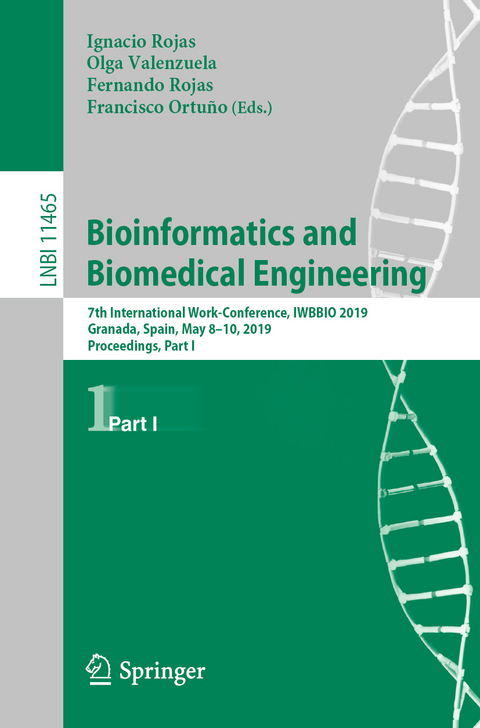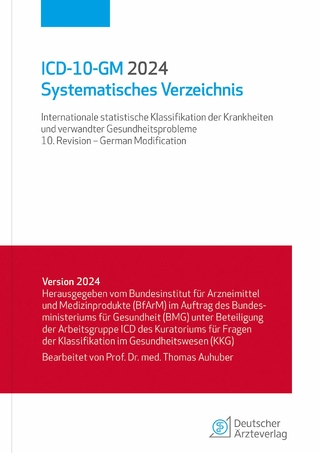
Bioinformatics and Biomedical Engineering
Springer International Publishing (Verlag)
978-3-030-17937-3 (ISBN)
The two-volume set LNBI 11465 and LNBI 11466 constitutes the proceedings of the 7th International Work-Conference on Bioinformatics and Biomedical Engineering, IWBBIO 2019, held in Granada, Spain, in May 2019.
The total of 97 papers presented in the proceedings, was carefully reviewed and selected from 301 submissions. The papers are organized in topical sections as follows:
Part I: High-throughput genomics: bioinformatics tools and medical applications; omics data acquisition, processing, and analysis; bioinformatics approaches for analyzing cancer sequencing data; next generation sequencing and sequence analysis; structural bioinformatics and function; telemedicine for smart homes and remote monitoring; clustering and analysis of biological sequences with optimization algorithms; and computational approaches for drug repurposing and personalized medicine.
Part II: Bioinformatics for healthcare and diseases; computational genomics/proteomics; computationalsystems for modelling biological processes; biomedical engineering; biomedical image analysis; and biomedicine and e-health.
High-throughput genomics: bioinformatic tools and medical applications.- A Coarse-Grained Representation for Discretizable Distance Geometry with Interval Data.- Fragment-based Drug Design to Discover Novel Inhibitor of Dipeptidyl Peptidase-4 as a Potential Drug for Type 2 Diabetes Therapy.- Discovery of Novel Alpha-Amylase Inhibitors For Type II Diabetes Mellitus Through The Fragment-Based Drug Design.- Compression of Nanopore FASTQ files.- De novo Transcriptome Global Assembly of Solea senegalensis v5.0 Using TransFlow.- Deciphering the role of PKC in calpain-CAST system through formal modeling approach.- The Application of Machine Learning Algorithms to Diagnose CKD Stages and Identify Critical Metabolites Features.- Expression change correlations between transposons and adjacent genes in lung cancer reveal a genomic location dependence and highlights cancer-significant genes.- Signal processing based CNV detection in bacterial genomes.- Omics data acquisition, processing, andanalysis.- Dependency Model for Visible Aquaphotomics.- Image based individual identification of Sumatra barb (Puntigrus tetrazona).- Alignment of Sequences Allowing for Non-Overlapping Unbalanced Translocations of Adjacent Factors.- Probability in HPLC-MS metabolomics.- Pipeline for Electron Microscopy Images Processing.- A Greedy Algorithm for Detecting Mutually Exclusive Patterns in Cancer Mutation Data.- Qualitative Comparison of Selected Indel Detection Methods for RNA-Seq Data.- Structural and functional features of glutathione reductase transcripts from olive (Olea europaea L.) seeds.- Bioinformatics approaches for analyzing cancer sequencing data.- Prediction of thermophilic proteins using voting algorithm.- Classifying Breast Cancer Histopathological Images Using A Robust Artificial Neural Network Architecture.- Spatial Attention Lesion Detection on Automated Breast Ultrasound.- Essential Protein Detection from Protein-Protein Interaction Networks Using Immune Algorithm.- Integrating multiple datasets to discover stage-specific cancer related genes and stage-specific pathways.- Integrated detection of copy number variation based on assembly of NGS and 3GS data.- Protein Remote Homology Detection based on Profiles.- Next generation sequencing and sequence analysis.- Reads in NGS are distributed over a sequence very inhomogeneously.- Differential Expression Analysis of ZIKV Infected Human RNA Sequence Reveals Potential Genetic Biomarkers.- Identification of Immunoglobulin Gene Usage in Immune Repertoires Sequenced by Nanopore Technology.- Flexible and Efficient Algorithms for Abelian Matching in Genome Sequences.- Analysis of gene regulatory networks inferred from ChIP-seq data.- Structural Bioinformatics and Function.- Function vs. taxonomy: the case of fungi mitochondria ATP synthase genes.- Non-Coding Regions of Chloroplast Genomes Exhibit a Structuredness of Five Types.- Characteristics of Protein Fold Space Exhibits Close Dependence on Domain Usage.- Triplet Frequencies Implementation in Total Transcriptome Analysis.- A hierarchical and scalable strategy for protein structural classification.- Protein structural signatures revisited: geometric linearity of main chains are more relevant to classification performance than packing of residues.- Telemedicine for Smart Homes and Remote Monitoring.- Positioning Method for Arterial Blood Pressure Monitoring Wearable Sensor.- Study of the detection of falls using the SVM algorithm, different datasets of movements and ANOVA.- Influence of illuminance on sleep onset latency in IoT based lighting system environment.- Clustering and analysis of Biological Sequences with Optimization Algorithms.- Efficient online Laplacian eigenmap computation for dimensionality reduction in molecular phylogeny via optimisation on the sphere.- PROcket, an efficient algorithm to predict Protein Ligand Binding Site.- Gene Expression High-Dimensional Clustering towards a Novel, Robust, Clinically Relevant and HighlyCompact Cancer Signature.- Computational Approaches for Drug Repurposing and Personalized Medicine.- When Mathematics Outsmarts Cancer.- Influence of the stochasticity in the model on the certain drugs pharmacodynamics.- Graph Model for the Identification of Multi-Target Drug Information for Culinary Herbs.- On Identifying Candidates for Drug Repurposing for the Treatment of Ulcerative Colitis using Gene Expression.
| Erscheinungsdatum | 14.04.2019 |
|---|---|
| Reihe/Serie | Lecture Notes in Bioinformatics | Lecture Notes in Computer Science |
| Zusatzinfo | XXX, 527 p. 208 illus., 153 illus. in color. |
| Verlagsort | Cham |
| Sprache | englisch |
| Maße | 155 x 235 mm |
| Gewicht | 848 g |
| Themenwelt | Informatik ► Weitere Themen ► Bioinformatik |
| Naturwissenschaften ► Biologie | |
| Schlagworte | Applications • Bioinformatics • biomedical engineering • Clustering • Computational Biology • Computer Science • conference proceedings • Databases • Feature Selection • health care information systems • Health Informatics • Image Processing • Imaging Systems • Informatics • Learning Algorithms • life and medical sciences • machine learning • Neural networks • Ontologies • recognition of genes and regulatory elements • Research • Signal Processing • Support vector • Support Vector Machines (SVM) • systems biology |
| ISBN-10 | 3-030-17937-0 / 3030179370 |
| ISBN-13 | 978-3-030-17937-3 / 9783030179373 |
| Zustand | Neuware |
| Haben Sie eine Frage zum Produkt? |
aus dem Bereich


